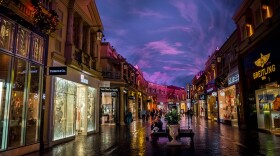Nevada’s economy is built upon the 24-hour party, the “What Happens Here, Stays Here” mantra.
Bo Bernhard, the vice president of economic development at UNLV's International Gaming Institute, has dubbed that mix Nevada’s "fun economy." It’s everything people come to Las Vegas for: shows, concerts, gambling and increasingly, sports.
And it’s a mix that is becoming more the norm for different economies all over the world. For the first time, tourism is now 10% of the world’s economic puzzle.
Of course, many will argue that the fun economy, or the reliance on it, can also be a detriment. And Las Vegas felt that after during the recession and the pandemic.
Bernhard joined State of Nevada host Joe Schoenmann; Alan Feldman, distinguished fellow from UNLV's International Gaming Institute; Myron Martin, CEO of The Smith Center; and Christi Nelson, the vice president of partner activation at T-Mobile Arena and MGM Grand Garden Arena.
Fun economy is actually a trademarked phrase, according to Bernhard, totaling about 15% of the economy. Manufacturing, for example, is only 11%.
“The future of the economy is bending in the direction of Las Vegas,” he said. “In many ways, Las Vegas has become a global intellectual capital of tomorrow's economy in sectors that are growing, rather than shrinking.”
Martin said seeing a show at Smith Center is all about that experience –being involved, enveloped in “this extraordinary thing that’s happening around you.” In the city that "invented fun," he said it makes them “up their game” more than if they were in another city.
Feldman expanded on that, noting Las Vegas invented the shift from buying things to buying experiences:
“We have been redefining the value proposition. And there's no escaping the fact that if you go back in time in Las Vegas, with rare exception, we were the capital of cheap rooms, cheap food, great entertainment. And think today about how that changed,” he said.
And there is research behind that, Bernhard noted. Twenty-five years ago, Martin Seligman presented research to the American Psychological Association showing money couldn't buy happiness when it comes to buying things, but it can when you're buying experiences.
"When you buy an experience, you'd have some anticipatory happiness spikes before the experience. You then spike again when you experience the thing. And then you actually have spikes post-experience, because you relive it as memory," Bernhard said.
Nelson said while the party is still very much the main draw, there's more to see in Las Vegas and tourists are taking advantage of that.
“But now I think there’s this whole different level of intelligence,” she said. “People are starting to realize that Las Vegas is more than just a party destination.”
There's an idea that intelligence is attached to enjoyment of certain types of entertainment. Martin said audiences of more traditional arts —symphonies, opera, ballet— typically have higher education in common, but they're able to offer more than that.
"People who live in Las Vegas come to The Smith Center with various educational backgrounds. But they have one thing in common, and that's that they are looking for that experience that is unique for them and their families to have right here at home. It wasn't that long ago where certain families could afford to go out of town to have a Smith Center-type experience. But not everybody could. The Smith Center has created an opportunity for people across the valley," he said. “No matter what neighborhood they come from, or what their daddy does for a living, [it’s] a place where they can be inspired by the arts and entertainment."
Decades ago, the opening of The Mirage helped pave the way for a more accessible tourism industry, setting the standard for modern resorts in size, experience offerings, education and price point.
“The experience of Las Vegas has always been dynamic and multi-layered. It's up to the visitor to choose which layers they want to experience,” Feldman said, referring to the property he helped get started. Bernhard called the property’s opening “the light switch moment.”
But, diversification is always the discussion when discussing one industry.
“Do we want economic development? Or do we want economic diversification? And I think the answer is actually pretty simple: Yes, yes, we do,” Bernhard said.
He said to think of the fun economy’s role in that as the Six Degrees of Kevin Bacon. For example, the NFL arena opens near the Las Vegas Strip, leading to sports medicine, leading to medical robotics, and so on.
Feldman agreed: “We have to get beyond the over-reliance on the direct tourism taxes, gaming room tax sales, tax generated on the Strip. What we need to do is exactly what Bo is pointing toward. Take a look at any of the shows, any of the events, any of the sporting events on the Strip, and kind of try to look just beyond the floor, the ice or the arena or whatever.”
“This is a city that attracts more human beings to this plot of Earth than any other plot of earth on Earth,” Bernhard added. “The Strip is the most visited tourist site on planet Earth. And everything that has drawn the record levels, 42 million people to Las Vegas during the course of a year, was hatched in the brain of Las Vegas.“
Bo Bernhard, vice president of economic development; executive director, International Gaming Institute, University of Nevada, Las Vegas; Alan Feldman, distinguished fellow in responsible gaming, International Gaming Institute; Myron Martin, president and CEO of The Smith Center for the Performing Arts; Christi Nelson, vice president of partner activation, T-Mobile Arena and MGM Grand Garden Arena











